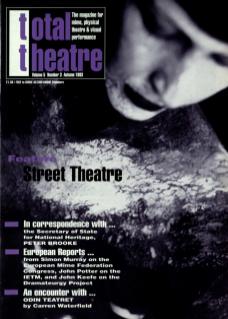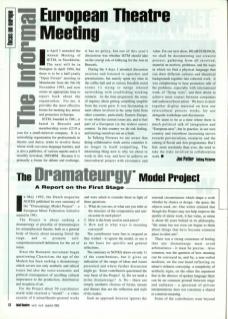In April I attended the Annual Meeting of IETM, in Stockholm. The next will be in Budapest in April 1994, but there is to be a half-yearly ‘Open Forum’ meeting in Manchester from 5-7 November 1993, and now seems an appropriate time to report back about the organisation. For me, it provides the most effective forum for meeting key artists and promoters in Europe.
IETM, founded in 1981, is based in Brussels and membership costs £219 a year for a small-turnover company. It is a networking organisation for professionals in theatre and dance, tends to involve those whose work can cross language barriers, and is also a publisher, of various reports and a 4 monthly news-sheet, Inform. Because it is primarily a forum for debate and exchange, it has no policy, but one of this year's discussions was whether IETM should take on the crucial role of lobbying for the Arts in Brussels.
During the four days, I attended discussion sessions and listened to speeches and presentations, but mainly spent my time in the coffee hall and at various Swedish social events (!) trying to merge relaxed networking with establishing working contacts. As the time progressed, the sense of urgency about getting something tangible from the event grew. It was fascinating to meet others involved in the same field from other countries, particularly Eastern Europe, to see what the current issues are, and to feel part of a European (in the widest sense) context. In this country we do risk feeling, and leaving, ourselves out on a limb.
In Talking Pictures we are aware that doing collaborative work across countries is no longer in itself compelling. The interesting thing now is why we chose to work in this way, and how to achieve an intercultural project with resonance and value. For our next show, Heartstrings, we shall be documenting our creative process, gathering from all involved material on motives, problems, and the ways in which we find a physical language that can draw different cultures and theatrical backgrounds together into coherent work. It was enlightening to hear promoters talk of the problems, especially with international work, of ‘flying visits’, and their desire to achieve more contact between companies and audiences / local artists. We have to draw together display material on how our intercultural process works, for use alongside workshops and discussions.
We seem to be at a time where there is much political talk of integration and ‘European-ness’, but in practice, in our own country and elsewhere, there are increasing moves towards provincialism, insularity and the cutting of Social and Arts programmes. But I feel, more resolutely than ever, the need to take the risks involved in collaboration work.

